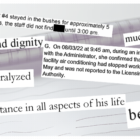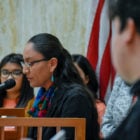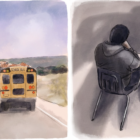Health
Assisted living facilities are the new nursing homes. Oversight falls short.
|
In July 2022, a partially paralyzed and “nearly bedridden” 75-year-old man in a wheelchair fell in his bathroom at Albuquerque Uptown Assisted Living, fracturing his hip, according to court filings.
But instead of staff immediately calling an ambulance for the man, who “required assistance in all aspects of his life,” he remained at the facility “in significant pain” for three weeks, his estate’s wrongful death lawsuit alleges. Eventually, the lawsuit says, he was taken to Presbyterian Hospital, where the elderly man was diagnosed with blunt pelvic trauma and a broken hip. He subsequently developed severe bed sores and infections. He was taken home, where his obituary says he died on October 1, 2022, his wife of 35 years at his side.
When the family’s attorney sought the man’s medical records, court documents claim, Uptown administrators said they did not have them. The man’s family could not be reached before publication of this story, and an Uptown official refused to answer New Mexico In Depth’s questions.
If the man’s case prompted scrutiny from state regulators, their report doesn’t appear in the health department’s health facilities inspection reports database.








